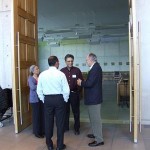This amazing story of the friendship of Lazarus and his sisters Mary and Martha with Jesus has much to teach us. Jesus and the disciples often visited their home. We remember the famous story of Martha and Mary; Mary had chosen the better part of sitting at the feet of Jesus and listening to him and Jesus praised her for doing so. When Lazarus became ill Mary and Martha sent word to Jesus but Jesus took his time getting there and when he arrived at their home Lazarus was dead for three days. Mary and Martha both scolded Jesus for his tardiness with the rebuke, ‘if you had been here our brother would not have died’, in other words, ‘where were you when we needed you?’
When the family took Jesus to the tomb Jesus wept and the crowd remarked on how much Jesus loved his friend Lazarus. To the amazement of all Jesus had the stone removed and called to his friend,’ Lazarus, come out’ and Lazarus came out of his tomb wearing his burial shroud. Jesus ordered, ’unbind him and let him go free.’ We can just imagine the astonishment of the crowd and the joy of Mary and Martha. They had their brother back.
Jesus showed his love for Lazarus not by healing him, as Mary and Martha hoped for; instead he called him back from the grave and offered him the glory of rising from the dead.
This powerful story offers us the opportunity to look at our personal relationships with family and friends. Mary and Martha complained Jesus was not there when they needed him. Are we there for family and friends when we are needed? Are we there with our understanding, patience, support and encouragement? Do family members and friends know they are not alone, that we are there for them? Do they know we share their worries and concern by the compassion we show them?
To do what he wanted to do Jesus told those present to take the stone away, remove the barrier between himself and his friend away. Sometimes in our relationships with family members and friends there can be the stone of resentment, anger, jealousy, misunderstanding, that keeps us apart. Are we willing on our part to take the stone away? Are we willing to roll back that life blocking, love blocking stone of resentment or anger?
Jesus’ last instruction was, ‘unbind him and let him go’. Do we bind up family members and friends with the demands and expectations we have of them? Are we willing to give them their freedom to find their own way and make their own way in life? Do we give them the freedom to be themselves?
Today’s gospel is a powerful story of the loving relationship of Jesus and his friends, Lazarus, Martha and Mary. It is more about life than it is about death. Jesus was the source of life and love to his friends. Are we sources of life and love and healing to the people who come into our lives?
 Founded by St. Paul of the Cross, every Passionist takes a special vow to spend his or her energies in promoting remembrance of the sufferings of Jesus, the memory of the Cross, and reflection of the meaning of the Cross for the world.
Founded by St. Paul of the Cross, every Passionist takes a special vow to spend his or her energies in promoting remembrance of the sufferings of Jesus, the memory of the Cross, and reflection of the meaning of the Cross for the world.




